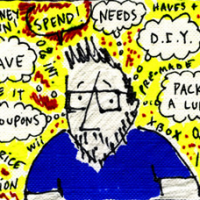Entrepreneurship
analysis, authority, product launch, trust, unconventional guide, working for yourself
As promised, here is the analysis and full results from the latest product launch. But first, a few notes on trust and authority – the good kind, not the kind you should fight against.
Having established that all purchases are highly emotional, and that buyers conduct an elaborate, internal analysis about price and value whenever they choose to purchase something, let’s talk know about trust.
We experience a certain combination of fear and trust whenever we buy something. The fear is that we will have wasted our money; the trust is the expectation that we haven’t. We look for immediate validation. Is the first song on the record good? Does the first article in the magazine hold my attention beyond the title?
If trust is confirmed, good. If not, we get worried. That’s why it’s important, whenever you sell something, to work hard at establishing and keeping the trust of your customers. Validation can come in many forms (and it’s good to mix it up a little), but the more, the better.
“Working for Yourself” Case Study
Two weeks ago, I launched my second information product, the Unconventional Guide to Working for Yourself. I completed this one after a month of writing, including an all-night session in Sri Lanka, and a few days of recording audio after I had returned to Seattle.
It was no exaggeration to say that I was hesitant to create a product that had to do with making money. It’s not that I think there’s anything wrong with making money – we all need money, and I prefer earning it on my own instead of working for someone else. Aside from robbing banks, those are the only two options (and I suppose that bank robbers are technically self-employed).
I was hesitant because I knew that when you sell something even remotely related to finance and employment, certain people get twitchy on you. They think you are up to something suspicious, even if you have an established reputation you probably wouldn't want to squander.
By the way, most rational people don’t do this, only those who were suspicious or skeptical to begin with. The rational prospects look at the offer, consider the qualifiers and “reasons why,” and then make their decision based on the value consideration. If yes, they buy; if no, they don't -- but they don't usually think less of you for it.
It’s Kind of Like Saying Who You Vote For
This week I received my early voting packet for Washington State, and I was proud to cast my vote for Barack Obama. In 12 years of being an eligible U.S. voter, this is the only time I can remember being genuinely excited about electing a candidate. There are a lot of good reasons to vote for change, but for me one of the most important is that this election has the chance to restore America's standing in the rest of the world.
If you don’t like Obama, do I worry that you’ll be turned off by my saying who I voted for? Not really. I have friends who support John McCain, and I don’t suddenly think their opinions are invalid just because they have reached a different conclusion than I have. I read blogs that are somewhat critical of both mainstream candidates, and as long as they don’t hit me over the head with too much rhetoric, I don’t mind.
It’s only the people who decide that you are a bad person or somehow naïve for expressing an opinion who will get upset.
I don’t care much for intolerance anyway, so if someone stops reading because I say I like Obama, then I think they’d probably be offended at something else sooner or later.
In the end, I decided that the same kind of principle holds true for creating a product about finance and self-employment. A few people get mad because it’s “not what you are supposed to do,” and a lot of other people will happily support you. Others decide it’s not right for them, but that’s OK – because they still care about other things you’re doing. I'll show you all three groups in the analysis here.
When I launched the first guide on Discount Airfare, I was careful to explain my controversial (apparently) opinion that artists should be allowed to make money. I did that to preempt the complaints about selling a product, lest I be unfairly accused of "selling out."
This time I took the qualification process even more seriously, clearly explaining several good reasons to not buy my product at the beginning of the launch process. I did this because I wanted only the customers who I knew would be thrilled and find the product very useful to them.
The Launch Day
I always get up early when launching a new product. In this case, I set the launch time for 7am PST, and I usually need at least 45 minutes to review everything before the actual launch.
I used to launch products and web sites at 8am EST, which meant that after I moved to Seattle I’d need to be up around 4:30 a.m. to accomodate this preference – but I decided that 10am EST would be just fine for this one.
Test… test… test.
There are always a few surprises when you sell something new. No matter how many times you test things, something will always go wrong for someone. The order link won’t work, the thank-you message won’t go out, the site will go down – count on it. This is why it’s good to stay close to the phone and email during any launch.
This time I got up at 5:30 a.m., ran through all the logistics, placed a test order, and so on. A few minutes before 7:00, I made my coffee and uploaded the order page to the site.
The Response
Some of you said you liked how I was willing to share real sales figures in a recent update. I’ll do the same thing here.
My initial goal was to sell at least 100 copies of this product in the first week. Within 24 hours, almost exactly 100 copies had sold, helping me reach the goal six days early. Yay!
More copies have continued to sell every day since then, and a number of people have asked about setting up a consulting session – something I didn’t really like to do before, but now I’m considering as a limited commitment for people who have already started their very small businesses.
The total conversion rate from the first week of regular readers was about 3.4%.
Since 1% is a general marketing baseline and I deliberately tried to disqualify people from buying the guide if it wasn’t a good fit for them, I thought that 3.4% was great. If anything, I want to be sure that I don’t focus too much on this side business while I continue to work on the more important goals of getting my book contract (more on that in a moment) and building our community here.
After all, even though I sold about $4,000 in the first 24 hours, the figure of 100 buyers represents only a small subset of readers. I have to keep the focus on the reason why people come here to begin with: to hear about unconventional strategies for life, work, and travel.
You guys are why I am doing it, whether you buy something or not… although naturally, I greatly appreciate the support and endorsement of your investment.
Good News / Bad News
The bad news was that, like last time, I heard from a few people who were upset about something that seems fairly irrational to me. Without fail, these comments come in from people who have never bought anything, and in fact have never communicated with me before.
I’m going to quote from one of these emails below for your consideration:
You preach about everyone being the master of their own destiny, but expect everyone to buy your [expletive] ebook on making money. This was a good blog until you blatantly tried to rip us off. How could you possibly try to [expletive] tell me what to do?
At first I thought this guy had meant to send this message to someone else. Expect everyone to buy? Blatantly try to rip you off? Tell you what to do?
I’m at a complete loss as to how anyone could get these ideas. I actually told people why they shouldn’t buy the guide, offered a more comprehensive guarantee than any I’ve ever heard of, and said that the primary goal of the guide is to help people create their own freedom to do what they want. Ironic, isn’t it?
There’s not much I can do in these cases except say, “I wish you the best” and move on – never argue with a crazy person, my mom likes to say -- but it does make me a little sad to hear how misguided someone can be.
Anyway, I know that the vast majority of people don’t think that way. Such is life with any kind of marketing in the blogosphere, even the no-hype kind. I posted the email here not because I’m upset, but so you can see that there will always be critics out to write you off whenever you do something of interest.
The lesson for me in this case is to avoid being distracted by random, negative messages like that. Before the end of the first afternoon two weeks ago, I had 60 new customers who were excited about the new product. I should have been thinking about those 60, and then the additional 40, and then everyone else who is happy -- not one negative message that I don't feel is valid.
Here is a sampling of the feedback from new guide owners:
First of all, congratulations. You've put together a great guide. It's helpful, realistic and down-to-earth, and I think it's one of the best ebooks I've read in a while. Very well done, and I hope it gets picked up widely!
Every bit as good as I'd expected, so many congratulations on putting together such a fantastic resource. I know a lot of people will benefit from it, including me. I've been in business for more than twenty years, and my view is that it's loaded with invaluable tips and top ideas which I'll be putting into practice myself.
I especially enjoyed the strategies for starting a microbusiness - especially the parts where it's broken down into pros, cons, and next steps. Including actionable items that I could get started on NOW is extremely helpful, especially for getting me to get off my butt.
I have about 50 reviews like those so far, both from the new guide and the first one. I’ve also asked people to send in suggestions for what could be improved in a future version or an email series I’m doing for the buyers. The feedback I’ve received thus far from many of you has been excellent. We’ve already issued some new material on the basis of those comments, and more will be on the way.
What’s Next
I have three more Unconventional Guides outlined, but at least two of them won't be written until early 2009. For now I want to continue promoting the current guide and working with the affiliates who are selling it around the internet. I’ll probably do a short post on the unconventional affiliate program in the next couple of weeks, but for now if you’re interested, just check out that link and let me know.
My number-one, most important work priority right now is finishing the latest version of my "real book" proposal (it’s up to 40 pages; who knew such a thing had to be so long?) and getting the process for the publisher shopping fully underway.
Next spring, I want to take the business side of things further and do a series of webinars for those who are interested. The webinars will be like the guides, only in multiple sessions and highly interactive. Anyway, more on that later – as mentioned, the proposal completion and book shopping are the most important projects for me at the moment. Onwards and upwards.
Lessons Learned
Miraculously, I don’t think I made any huge mistakes with this product launch. I’m certainly open to constructive feedback, and I realize there are things I could have done to increase the sales further, but overall I’m happy with the results.
Here’s a couple of technical points, for those interested in the details:
-
I haven’t quite made up my mind yet about using different domains for the different products. For now, the Discount Airfare guide and the Working for Yourself guide still “live” directly on this site, although I also have a simple structure set up on UnconventionalGuides.com. I should probably decide what I’m doing with the navigation before launching the next product
- Someone asked why I am using e-junkie and PayPal to facilitate the payments when I say in the guide that having your own merchant account is a better solution. Good question. The short answer is that I don’t want to comingle my bank accounts (at least, as little as possible) and we are coming to the end of the 2008 tax year. I didn’t really start this project to make money, but if it continues to do so, then I’ll probably incorporate a more complete payment processor in the beginning of 2009.
(If those two statements don’t mean much to you, don’t worry, you’re not missing out on anything terribly important.)
The Best Lesson
When people trust you, they know you are going to put out good work. Some of them are actually willing to pay for it.
I’m tremendously grateful for that trust. Thanks so much.
And for everyone who does not want a very small business, as promised, I am not “selling out” (whatever that means). As you can see from recent posts, I will continue to write about lifestyle design, world domination, unconventional travel, and whatever else I come up with that you guys enjoy.
###
RSS Feed | Email Updates | A Brief Guide To World Domination |
Unconventional Guides:
Working for Yourself: Creating Personal Freedom
Discount Airfare: Surviving Stress and Maximizing Fun
Did you enjoy this article? Please pass it on to others at StumbleUpon, or share your own thoughts in the comments section.
Read More




 The Dream and the Realization
The Dream and the Realization









